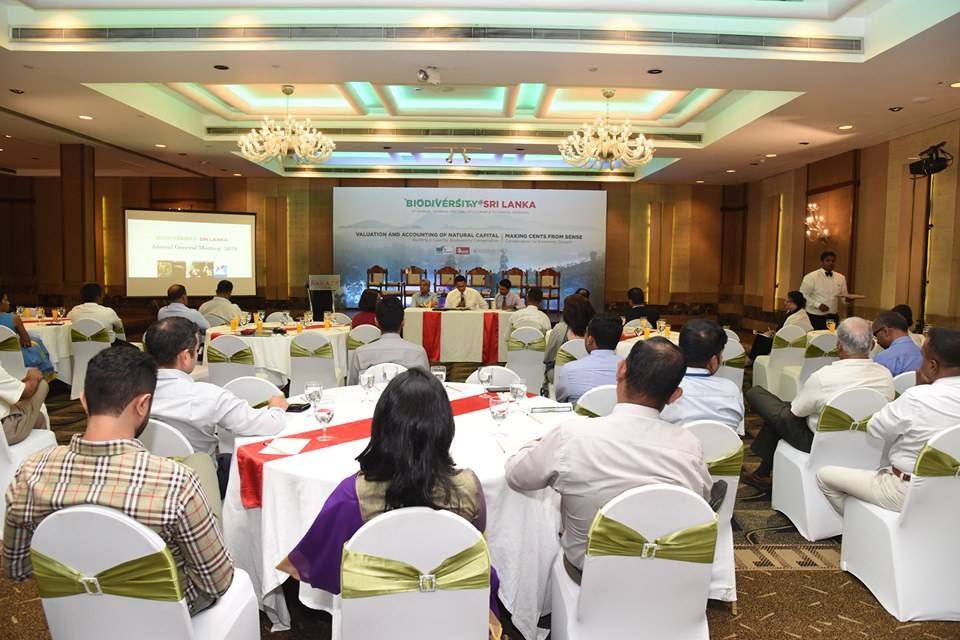
Join us for BSL’s Annual Technical Sessions, AGM & CEO Forum on the 2nd & 3rd November 2022
SUSTAINABLE USE – PATHWAYS INTO THE FUTURE
Session 1: 09.00 am – 10.30 am
Innovative Financing mechanisms for SDG implementation in Sri Lanka
Auditorium of the Bandaranaike Center for International Studies (BCIS)
The 2030 Agenda for Sustainable Development and the Sustainable Development Goals (SDGs), adopted in 2015, aim to provide a common, integrated global framework for peace and prosperity for people and the planet, now and into the future. Although the 2030 Agenda presents SDGs independently, it highlights that they are indivisible and emphasizes the importance of understanding and acting upon the complex spatial and temporal interactions that exist between SDGs and the need to ensure that progress made in some sectors or countries does not hinder progress in others.
Sri Lanka’s commitment to achieving the SDGs is explicit in its continued pursuit of national policies and development plans and programmes in alignment with the SDGs. The Government of Sri Lanka and UNDP in Sri Lanka recently announced the launch of the Sri Lanka SDG Investor Map, a market intelligence tool that seeks to direct private capital where Sri Lanka’s SDG priorities, Government policy and market opportunity intersect, as the country seeks to rebuild its economy sustainably, using the SDG framework as its guide.
Innovative financing mechanisms become imperative to synergize the government, private sector, and capital markets to generate the additional resources needed to finance the SDGs. The SDG Investor Map is therefore a timely intervention that would provide interested investors with the required market information relating to potential investment opportunity areas. While there is much to be done, there is a great opportunity for the private sector to integrate sustainability and the SDGs into their investments and businesses to help Sri Lanka build forward better. This coupled with the adoption of the SDG Impact Standards which guides the private sector to manage their impact, will further the country’s ability to build a more resilient future, leaving no one behind.
In partnership with the Sustainable Development Council, the session will focus on the SDG Investor Map and Green Financing Support for SDG implementation in Sri Lanka including an engaging panel discussion with diverse stakeholders.
Session 2: 11.00 am – 12.30 pm
Aligning business action with the Post-2020 Global Biodiversity Framework and 2030 Action Targets
Over the last two years, we have seen significant engagement from 1,100 companies that are advocating for a nature-positive world, and hundreds of leading companies making commitments and applying available tools and data to help implement and deliver the relevant targets included in the Post-2020 Global Biodiversity Framework (GBF). There are more targeted resources on the way to support business implementation, such as the Science Based Targets Network (SBTN) and the Taskforce on Nature-related Financial Disclosures (TNFD).
The Convention on Biological Diversity’s Conference of Parties 15 (COP15) is now set to take place at the headquarters of the Secretariat of the Convention on Biological Diversity (SCBD) in Montreal, Canada from 5 to 17 December 2022. Member states will adopt the Post-2020 (GBF) at COP 15, which will hopefully provide a clear direction and strong signal on the need to halt and reverse nature loss by 2030. Based on Target 15 – Role of business, there has been significant momentum in favor of mandatory requirements for businesses and financial institutions to assess and disclose their impacts and dependencies on nature. The need for business and financial institutions to reduce their negative impacts on nature by at least half and increase positive impacts has also been supported by many countries during the negotiations but will need further discussion in Montreal.
The session will engage with experts from the World Business Council on Sustainable Development (WBCSD), discuss road maps that break down what nature-positive means for business to help companies understand what nature positive means for their sector and break down key actions businesses need to consider to address nature loss. These Roadmaps include guidance on assessing dependencies, measuring impacts and tracking efforts to halt and reverse nature loss across the value chain.
Session 3: 02.00 pm – 04.30 pm
Building Partnerships for Science-based Ecosystem Restoration
Actions that sustain and restore diverse and functioning ecosystems are essential for human safety, health and prosperity. With 2021–2030 declared as the United Nations Decade on Ecosystem Restoration, efforts are scaling up to halt, reverse and prevent future degradation of ecosystems worldwide, including natural, semi-natural, managed, production and urban ecosystems. Sustaining and restoring ecosystems requires public support and leadership from nation-states and civil society, underpinned by sound science, and is driven by the collective action of multiple actors whose actions impact and are impacted by ecosystems. To move the goals of the UN Decade on Ecosystem Restoration forward, this session will demonstrate, show case and address through BSL’s successful public private people’s partnerships – fundamental questions, and present key messages to bring effective and long-term action, providing recommendations on how to build the ecosystem restoration movement.
Be a part of LIFE: Breathing new life into reality.: Beyond five years of restoration in Kanneliya Conservation Forest, Halgahawala, Opatha.
CEO Forum on Climate Financing
Thursday 3rd November 2022: 5.00 – 6.30 pm
Grand Ballroom – Ramada Colombo
Climate finance seeks to support mitigation and adaptation actions that will address climate change. The Convention, the Kyoto Protocol and the Paris Agreement call for financial assistance from Parties with more financial resources to those that are less endowed and more vulnerable. This recognizes that the contribution of countries to climate change and their capacity to prevent it and cope with its consequences vary enormously. Climate finance is needed for mitigation, because large-scale investments are required to significantly reduce emissions. Climate finance is equally important for adaptation, as significant financial resources are needed to adapt to the adverse effects and reduce the impacts of a changing climate.
In accordance with the principle of “common but differentiated responsibility and respective capabilities” set out in the Convention, developed country Parties are to provide financial resources to assist developing country Parties in implementing the objectives of the UNFCCC. The Paris Agreement reaffirms the obligations of developed countries, while for the first time also encouraging voluntary contributions by other Parties. Developed country Parties should also continue to support country-driven strategies, and taking into account the needs and priorities of developing country Parties. Such mobilization of climate finance should represent a progression beyond previous efforts.
It is important for all governments and stakeholders to understand and assess the financial needs of developing countries, as well as to understand how these financial resources can be mobilized. Provision of resources should also aim to achieve a balance between adaptation and mitigation.
Overall, efforts under the Paris Agreement are guided by its aim of making finance flows consistent with a pathway towards low greenhouse gas emissions and climate-resilient development. Assessing progress in provision and mobilization of support is also part of the global stock take under the Agreement. The Paris Agreement also places emphasis on the transparency and enhanced predictability of financial support.
The proposed policy dialogue will explore the feasibility of promoting Climate Financing and understanding how these financial resources can be mobilized to achieve a balance between adaptation and mitigation.
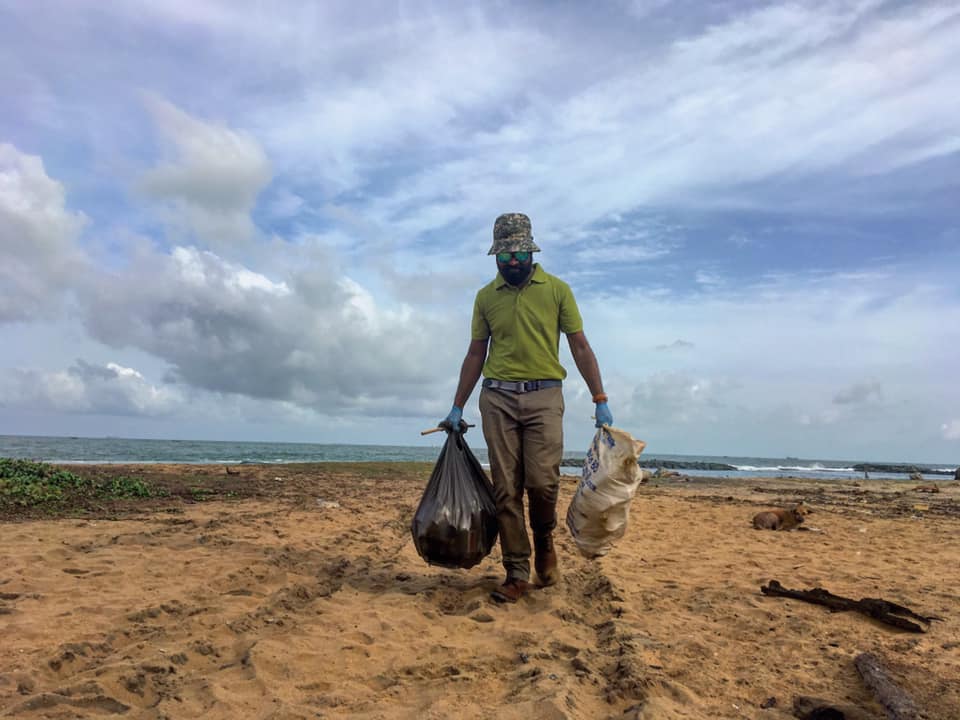
Joint Action on World Cleanup Day 2022
World Cleanup Day is an annual global social action program aimed at combating the global solid waste problem, including the problem of marine debris. World Cleanup Day harnesses the power of people around the world to achieve incredible things by joining together. Its beauty lies in co-operation and collaboration: building bridges between disparate communities, and including all levels of society – from citizens to business, to government. This year’s World Cleanup Day took place on September 17th, 2022.
On this day, Biodiversity Sri Lanka (BSL) collaborated with the Marine Environment Protection Authority (MEPA), its Patron Member, Citizens Development Finance PLC (CDB), and SME Member Mai Globe Travel to conduct two beach cleanup events in Modara- Pollwatte and Wellawatta. Our Patron Member, Abans Cleantech (Pvt) Ltd, the environmental management arm of the Abans Group responsibly disposed of the collected waste at their recycling facility.
CDB employees alongside their family members participated in this worthy cause. An 800m beach stretch, polluted with lots of plastics, glass, rubber, and other debris was cleaned up. More than 100 poly sack bags full of segregated waste and debris were collected from the stretch. This clean-up initiative was a part of BSL’s ‘Life to our Beaches’ Program which is a public-private-community partnership for maintaining Sri Lankan beaches clean and healthy. CDB has partnered with BSL under this program to look after the Modara- Polwatte beach stretch for a year. After the initial clean-up was done on World Cleanup Day, the stretch was handed over to the appointed Samurdhi beach caretaker for maintenance under the supervision of MEPA and BSL.
Mai Globe is a travel agency based in Sri Lanka and Vietnam, committed to improving sustainability and responsible tourism. As a part of its commitment to the planet, Mai Globe undertook the beach clean-up in Wellawatta. 15 employees were engaged in the clean-up, cleaning a 300m beach stretch. The marine debris collected included PET bottles, glass bottles, cloths, Styrofoam, and e-waste items, amounting to 20 poly sack bags.
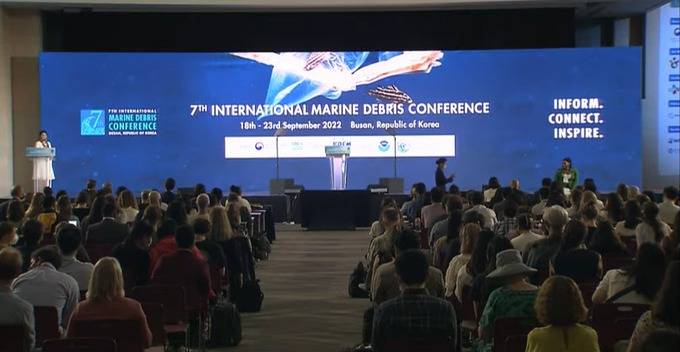
CCC and BSL take the Sri Lankan EPR Journey on Plastics Waste Management to the 7th International Marine Debris Conference (7IMDC) held from September 18th to 24th in Busan, South Korea
Our Board Director Mr Chandraratne Vithanage and Programme Manager, Roshan Salinda attended the world’s longest-running international conference series dedicated to the issue of marine litter and plastic pollution recently. IMDC is well-recognized as a platform for bringing together governments, industry, academia, civil society, and all relevant stakeholders to discuss the latest science, strengthen collaborations, find solutions and catalyze action to address the urgent, global problem of marine litter and plastic pollution.
The 7IMDC was held with the participation of 760 people physically, and 183 people virtually from 89 countries. The Conference had 110 sessions under 9 technical tracks, namely Monitoring, Research, Technology & Innovation, Education, Awareness & Communication, Regulation, Laws & Policy, Circularity & Waste Management, Economics, Financing & Private Sector Engagement, Sea-based Sources, and International Collaborations. There were 564 presentations and 234 posters, generating more than 130 hours of substantive content for consumption. To connect with each other, there were many opportunities and medium available throughout the conference. These include 7IMDC App, networking events such as social events and luncheons, and the Global Partnership on Marine Little (GPML) digital platform. It was inspiring to interact and see the energy of a global like-minded, passionate, rapidly growing community to tackle the marine plastic issue. The sense of purpose was noticeable among speakers to inform and drive solutions and actions while continuing to do more research on marine litter.
The Ceylon Chamber of Commerce (CCC) and Biodiversity Sri Lanka (BSL) made a joint presentation on the Sri Lankan EPR Journey on Plastics Waste to this international audience in session 5.1 titled non-state actors in governance solutions to plastic pollution. The participants were appreciative of the work carried out and suggested that Sri Lanka can generate a blueprint for industry-led volunteer EPR programs in South Asia.
The knowledge gained and connections made from 7IMDC will be extremely important for both CCC and BSL to expand and enrich joint EPR efforts.

PLASTICS
BSL commences “Promoting Long-term Approaches for a Sustainable, Transformative and Inclusive Circular Economy in Sri Lanka” Project
Sri Lanka has steadily increased its import of plastic, with over 500,000 metric tons (MT) of virgin plastic imported to the island annually, straining the national waste management system. It is estimated that 1.59 million tons of plastic waste are mismanaged in Sri Lanka annually, of which approximately 69,000 tons end up in canals, rivers, and eventually the ocean, endangering marine ecosystems, and even leading to landfill collapses. In Sri Lanka, the problems associated with plastic waste lie equally with the present haphazard disposal practices as with the rate of generation.
In order to address this plastic waste issue, under the leadership of the Agency for Technical Cooperation and Development (ACTED), BSL is part of a consortium implementing a project titled Promoting Long-term Approaches for a Sustainable, Transformative and Inclusive Circular Economy in Sri Lanka (PLASTICS). The other partners in the consortium are Industrial Services Bureau (ISB), STENUM Asia, and The Energy and Resources Institute (TERI), India. The project facilitates both plastic waste minimization and management in Sri Lanka by integrating small and medium enterprises (SMEs) in a greener value and supply chain (V/SC), thereby contributing to economic prosperity and environmental sustainability. The 48-month-long action is intended to specifically improve economic development within the plastic V/SC through SME resource efficiency, circular innovation, green finance, and sustainable waste management (SWM) frameworks in the Western Province of the country.
The Western Province will benefit an estimated 5.82 million final indirect beneficiaries covering all household-level consumers. The direct beneficiaries/target groups are 150 SMEs in the plastic V/SC that will benefit from enhanced green business development processes, including (1) brand owners and high plastic users, especially within the food and beverage value chains; (2) plastic producers/importer; (3) informal/formal collectors; (4) recyclers/up-cyclers; with a particular focus on women-led SMEs.
Output Four of the Project for which BSL is responsible will strengthen the traceability, transparency, and compliance to plastic SWM through public-private dialogue, collaboration, and monitoring. BSL will map relevant national/regional/international policies, legal frameworks, regulations, and initiatives related to plastic SWM, and will carry out a desk review of EPR frameworks in the country, region, and beyond. BSL will undertake a consultative process to set up a management framework of the National Clearing House (NCH) for EPR on Plastic Waste so that it can become a self-sustaining resource and reporting center for plastic take-back schemes. Further, the project will help to shape the national EPR dialogue as it will work with global partners in standardizing national EPR frameworks (inclusive of legal frameworks).
To promote EPR standardization, BSL will undertake a national-level communication campaign on EPR. Multiple communication tools including social media will be deployed in rolling out this campaign. A key target group of the campaign will be SMEs in the plastic sector. BSL will be accountable for communicating EPR at the national level and facilitating EPR policy dialogues.
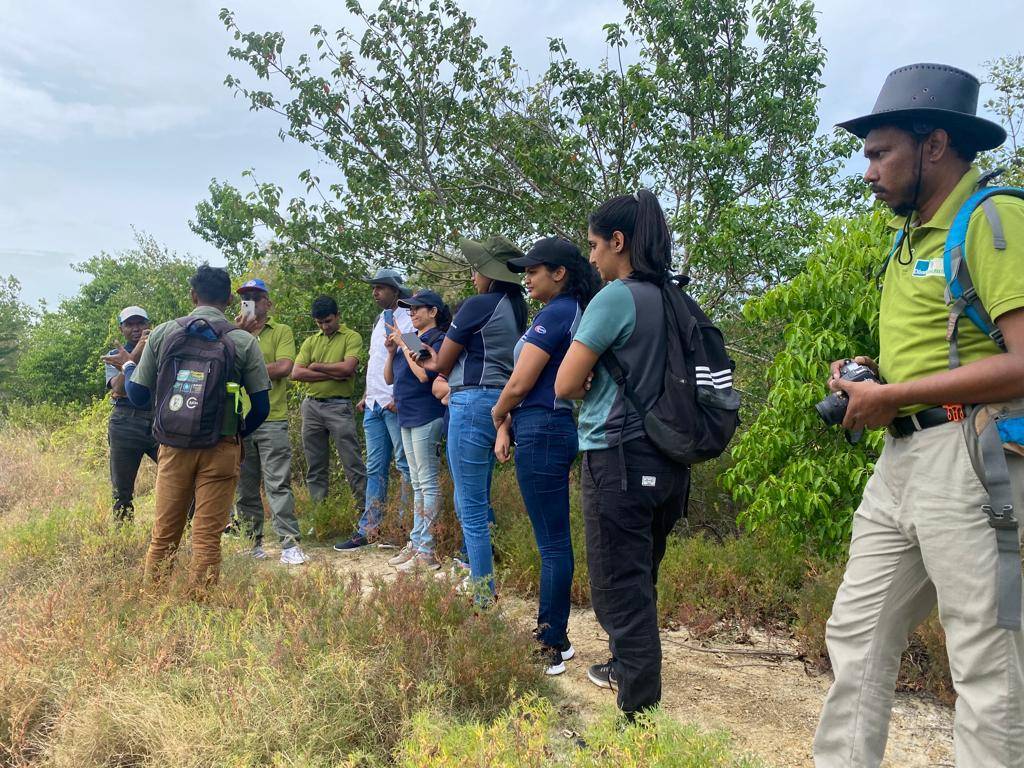
“Life to Our Mangroves” – A Partners led Effort
LIFE to Our Mangroves is one of BSL’s landmark multi-partner public-private partnership projects aiming to assist in restoring degraded mangrove patches located in the Anawilundawa Ramsar Wetland Sanctuary. The Anawilundawa Wetland Sanctuary spans over 1,397 hectares and is an amalgamation of forest wetlands like mangrove and freshwater swamps, coastal saltwater ecosystems, and freshwater lakes. It is one of Sri Lanka’s six designated Ramsar Sites.
The selected patches have become degraded due to intensive shrimp farming projects that took place over three decades ago. Led by the Department of Wildlife Conservation (DWC) and the Wayamba University (WUSL), the restoration activities are to be conducted using scientific principles, to enhance ecological functions, habitat quality, species diversity, and capacity to provide biodiversity and ecosystem services that are in close approximation to what prevailed before it was converted to the present state. Further, the project is expected to give a boost to the local economy by providing employment opportunities to adjacent communities as well as by local project purchases. In parallel to the restoration of this degraded wetland, BSL is in discussion with the DWC and the Sri Lanka Climate Fund is in the process of planning to assess and issue Carbon Credits to the partners.
BSL together with some of the project partners conducted a field visit to the site on 5th July 2022. The purpose of the visit was to hold discussions with the DWC personnel on-site, assess the field situation, and obtain practical insights on the status and planned activities. During this visit, the DWC Park Warden provided a detailed account of the site and its ongoing pilot mangrove restoration activities. He mentioned that for the current restoration effort a new mangrove restoration technique will be used which is based on the hydrological studies undertaken recently by the Sri Lanka Navy. The new plan for commencing restoration activities was presented to all stakeholders on 27th July 2022, by the DWC and the Wayamba University, co-coinciding with the International Day for the Conservation of the Mangrove Ecosystem. Phase 1 will commence with the plots closest to the Dutch Canal.
Project partners interacted with DWC officials by asking questions pertaining to the site, thus actively engaging in planned restoration activities. After this interactive session, the partners observed the land plots allocated to BSL for restoration activities. During the post-lunch question and answer session, DWC officials explained that the hydrological plans, prepared by the Sri Lankan Navy, will be a key element in the overall restoration approach. There will be a separate hydrological plan for each land plot. They further clarified that land plots closer to the Dutch Canal will be re-planted with true mangrove species and the plots which are located more landwards from the Dutch Canal will also carry mangrove associates and other terrestrial plant species. At the conclusion of the field visit, partners symbolically planted mangrove saplings/ propagules at the site.
Currently, BSL members Citizens Development Business Finance PLC, Dilmah Ceylon Tea Company PLC, Dole Lanka (Pvt.) Ltd., Dynawash Ltd., Eswaran Brothers Exports (Pvt.) Ltd., National Development Bank PLC, and Sampath Bank PLC are partnering with BSL in this restoration effort. More information on how you can engage in this Project can be had from: Roshan@biodiversitysrilanka.org
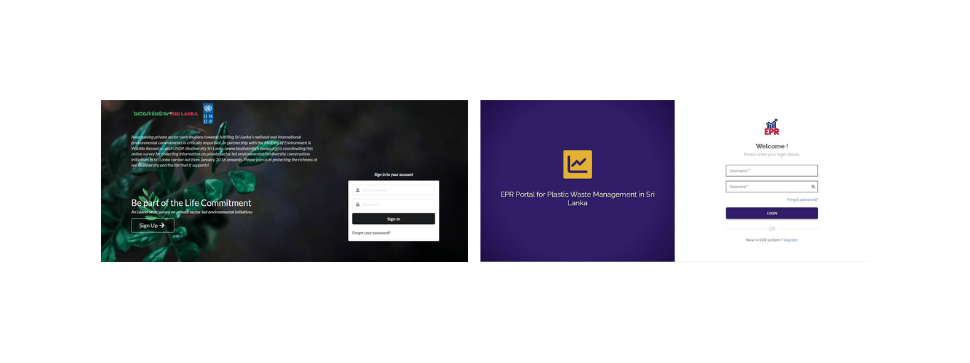
Patron Member Virtusa in support of Nationally Significant Sustainability Efforts
BSL’s Patron Member Virtusa stepped up in 2021, to design, establish and operationalize “Life Commitment” – BSL’s Online Reporting System for documenting private sector contributions on present and planned initiatives in biodiversity/environmental conservation. This effort is intended to provide much-needed information to the Government of Sri Lanka for successfully meeting the country’s national and international environmental commitments.
Denver Denver De Zylva – Vice President, Virtusa (Pvt.) Ltd.
This comprehensive data gathering repository currently online, has multiple uses – one of which is that the Government of Sri Lanka will be able to easily identify private sector contributions towards its multiple national and international commitments, including the National Biodiversity Strategic Action Plan (NBSAP), the Aichi Biodiversity Targets, the National Adaptation Plan (NAP) for Climate Change Impacts in Sri Lanka, the UN SDGs and the country’s commitments towards the Bonn Challenge. The survey also documents hitherto un-available financial investments made towards these initiatives over a determined period.
In the first phase, a comprehensive database of projects carried out by BSL’s members was established. Upon completion of this initial phase, Virtusa made the survey software foolproof by addressing technological issues that appeared during the initial deployment. Further, the survey platform was upgraded with visually appealing graphics to attract the wider private sector to submit their project information with the inclusion of online analytical tools for reporting.
Following closely on the heels of this successful initiative in 2022, Virtusa extended further technical support to the Ceylon Chamber of Commerce and Biodiversity Sri Lanka to design, establish and operationalize an online Plastic Waste Reporting System, the objective of which is to enable up to date reporting of plastic waste collection by corporates dealing with PET and HIPS and monitoring the fulfillment of their EPR commitments in terms of achieving national collect back targets. The reporting system will help regulatory authorities to assess the progress of the plastic waste collection of corporates dealing with plastic packaging at any given time. This reporting system is currently online and in use.
The support extended by Virtusa to these nationally significant efforts is a step in the right direction in the country’s sustainability journey.
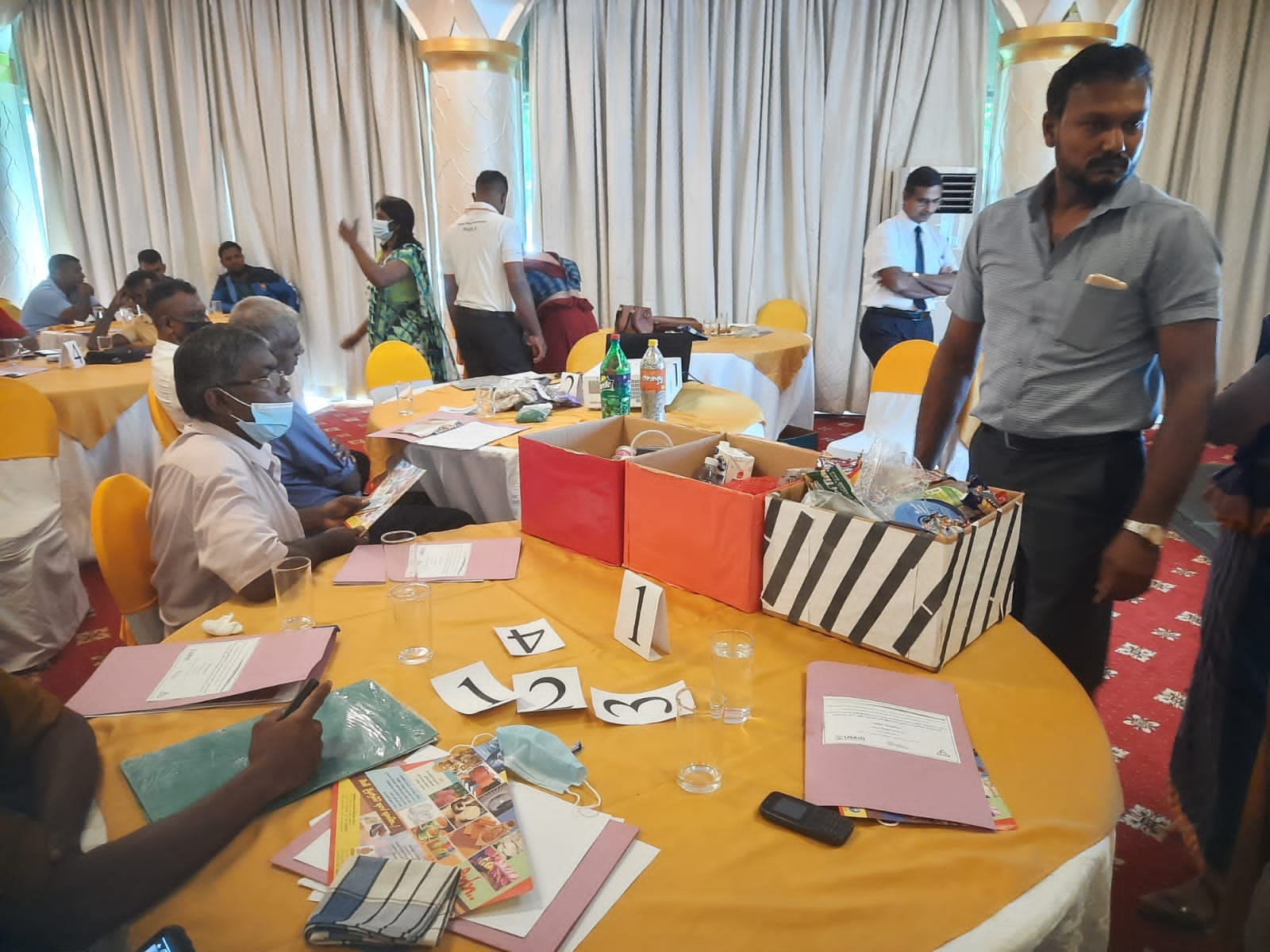
Waste Collectors & Recyclers in the Kalutara District Trained
With the aim of facilitating the implementation of the recently launched Extended Producer Responsibility (EPR)Model for Plastic Waste Management in the country, the Ceylon Chamber of Commerce (CCC) and Biodiversity Sri Lanka (BSL) in partnership with the Western Province Waste Management Authority (WPWMA) undertook a training program for waste collectors and recyclers in the Kalutara District on June 23, 2022, at Hotel Panaroma. This program was conducted under the capacity-building component of the USAID-supported project to implement an EPR system for plastic waste management in Sri Lanka. Thirty-three (33) collectors and recyclers participated in the program despite prevailing transport issues, which is a significant indication of the level of interest amongst collectors and recyclers.
Mr. Nalin Mannapperuma, Director/ CEO of the WPWMA conducted an introductory session on Solid Waste Management. A practical session on the identification of recyclable materials and various plastic types was conducted by Mr. R. M. N. Silva, Deputy Director (Technical) of the WPWMAy. The practical session was very interactive as collectors and recyclers were asked to identify various plastic types from a set of plastic articles in a box and to explain the processing method applied for each type. Mr. B. D. Taranga, Industrial Development officer, Industrial Development Authority, Western Province presented the financial facilities available for collectors and recyclers. He mentioned that if the country was not facing transport and other serious economic issues at the moment, they would have conducted a session with the participation of representatives from leading banks to register collectors/ recyclers for loan facilities.
A SWOT analysis was conducted to identify strengths, weaknesses, opportunities, and threats in the plastic waste collection sector through group work. Four (4) panelists including representatives from Project Teams, WMA, and Eco-Spindles provided expert inputs for the analysis. They also discussed potential ways of addressing some of the pressing issues, such as obtaining business registrations, and the poor recognition accorded to collectors.
The session titled “How to become an entrepreneur” was conducted by Mr. Priyankara Dissanayaka, Manager Sourcing, Eco-Spindles. In his presentation, he briefly touched on theoretical aspects of entrepreneurship and also provided examples of successful entrepreneurs with references to their traits and the challenges faced during their journeys. A session on leadership was conducted by Mr. Nimal Premathilake, who provided practical insights on leader mindsets which are essential for achieving challenging milestones.
As a follow-up action, the participants were requested to register with the WPWMA. In this regard, relevant application forms were distributed during the program. Overall, the participants expressed that they gained new knowledge and mentioned that they are looking forward to engaging more closely with WPWMA for matters pertaining to their operations. Mr. Roshan Salinda who attended the program representing the Project and BSL pointed out that it is important to prioritize some of the most critical issues faced by waste collectors/ recyclers and subsequently work towards addressing each of them collectively with a timeline for the benefit of the country. In conclusion, the WPWMA, stated that as the principal organization responsible for managing solid waste management affairs in the Western Province, will remain committed to resolve issues faced by collectors/ recyclers to uplift the waste collection/ recycling industry in the province.
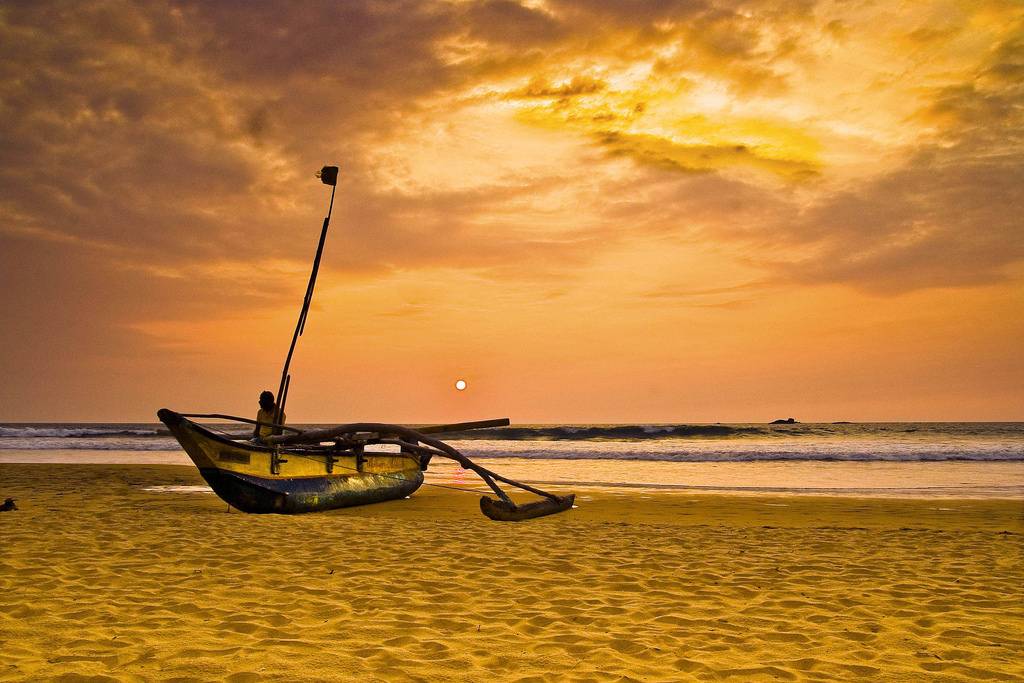
‘Life to Our Beaches’ partners with Samurdhi in Beach-caretaker training
Sri Lanka’s beaches are well-known worldwide for their elegance. The entire island is surrounded by beautiful coastal stretches of around 1,710 kilometers. Nevertheless, based on the anticipated volume of improperly handled garbage, Sri Lanka has been included among the top disposers of marine litter globally. (Meijer et al. 2021). Any persistent, manufactured, or processed solid material that is discarded, disposed of, or abandoned in the marine and coastal environment is referred to as marine litter. When plastic waste is not properly disposed of, it can enter the marine food chain, endangering the health and safety of coastal and marine species. Therefore, it is essential to take action to maintain our beaches safe, clean, and free of any risks so that visitors could relax and enjoy the beach stretches around the country.
The solid debris that washes up on our coasts frequently originates from both domestic and international sources. Rubber, plastic, glass, and aluminum-based materials are often collected from our beaches. These can be used wisely to create valuable resources through upcycling and recycling. To preserve a safer and more sustainable coastal environment for the benefit of all, immediate actions must be taken to ensure that our beaches are regularly inspected, cleaned, and managed responsibly. In this regard, in collaboration with the Marine Environment Protection Authority (MEPA), the Department of Samurdhi Development (DoSD), and member companies, BSL launched the programme called “Life to Our Beaches”. This programme has been designed as a Public-Private Partnerships (PPP), through which local communities also reap financial benefits by involving themselves in beach cleaning activities. They also derive an additional income by selling the recyclable waste collected.
With the participation of Patron Member DIMO, BSL operationalized a programme for the Dikovita beach stretch in Wattala. As the first step, BSL conducted technical training for the beach caretakers on collecting and identifying various types of plastics and other marine litter in the identified Dicovita stretch. The main objective of the training was to equip the beach caretakers with the necessary knowledge to identify the common types of plastic waste materials using an identification number. The 7 different kinds of plastics namely PET, HDPE, PVC, LDPE, PP, PS, and other plastic types were listed in order from 1 to 7. The packaging items and plastic bottles were utilized to demonstrate the common use of those plastic types.
The value of working as beach caretakers was recognized in the training program. It is a crucial service that helps in protecting the country’s stunning beaches. They were also made aware of the value of the trash they were collecting from the beaches and how they might sell it to supplement their family’s income. During the session, it was emphasized the need of taking health and safety measures when picking up rubbish on beaches. They were advised to keep records of the monthly collection in terms of the type of waste materials for monitoring purposes.
The project will continuously monitor the progress of beach cleaning activities and support the recyclable waste collected towards composting, recycling, and safe disposal. The Beach Caretaker Program is a breakthrough local conservation effort that inspires communities to act to protect their environment from coastal pollution whilst leading to socioeconomic gains. The Beach caretaker program is a powerful illustration of how community-led conservation programs can create a significant positive impact and alter the bleak future of the planet. They also serve as a reminder that every action, no matter how small, can have a rippling effect.

Ceylon Chamber and Ministry of Environment Propose ‘Collect-Back’ Plastic Waste Management Model for the Private Sector
To tackle the escalating issue of Sri Lanka’s plastic waste management, the Ceylon Chamber of Commerce has initiated the implementation of an Extended Producer Responsibility (EPR) model, which requires all stakeholders generating plastic waste to take responsibility for recycling and minimizing the use of plastic packaging.
‘The Ministry of Environment will support and welcome all initiatives started by the private sector including the implementation of the Collect-Back Target model proposed by the Ceylon Chamber of Commerce. The Central Environmental Authority will closely monitor the progress of proposed mechanisms and complete the legal provisions required for meeting efficient outcomes from each method. The Ministry of Environment and the Central Environmental Authority reiterate the necessity of playing an active role by the private sector to adhere to the EPR principle with Best Available Technologies’, Secretary to the Ministry of Environment, Dr. Anil Jasinghe stated.
The Ceylon Chamber and Biodiversity Sri Lanka (BSL) with financial support from the United States Agency for International Development (USAID) developed the EPR Roadmap in 2021, to provide a strategic plan for plastic waste management in Sri Lanka. The implementation of the Mandatory Reporting and Collect-Back (MRCB) model was recommended under this EPR Roadmap. This EPR scheme based on MRCB model was developed under the guidance of a Project Steering Committee comprising of key Government Agencies including; Ministry of Environment, Central Environmental Authority (CEA), Marine Environment Protection Authority (MEPA), Coast Conservation & Coastal Resource Management Department (CC&CRMD), Western Province Waste Management Authority (WPWMA), State Ministry of Provincial Councils & Local Government Affairs, Colombo Municipal Council (CMC) and IUCN Sri Lanka as well as private sector representatives from beverage, water bottling and dairy sectors.
The MRCB model requires plastic users to declare their annual usage and pledge to collect back an agreed-upon percentage, targeted to reach close to 100% over a five-year period. The initiative aims to increase plastic waste collection and recycling in order to minimize plastic pollution. The proposed Collect-Back Target model has been endorsed by the Ministry of Environment (MoE) and the Central Environmental Authority (CEA), and welcomed by the private sector.
‘There is an urgent need for an integrated and collaborative approach within the plastic value chain in order to implement a sustainable framework, ensuring effective and effective plastic waste management. The Collect-Back Target model will help to promote greater accountability among corporates and ensure an efficient system of monitoring and evaluation’, said CEO and Secretary-General of the Ceylon Chamber of Commerce, Manjula de Silva.
At this event, Dr. Anil Jasinghe, Secretary to the Ministry of Environment launched the online reporting system, which was designed and developed by Virtusa Pvt Ltd., on which platform the private sector will commence reporting on waste collection and recycling.. The initial phase will focus on two types of plastics, namely, Polyethylene Terephthalate (PET) and High Impact Polystyrene (HIPS) packaging. The outcome of voluntary EPR implementation will be documented to draw lessons that can be applied to a mandatory collection and reporting system in the future.
The project is guided by a high-level multi-stakeholder Project Steering Committee, co-chaired by the MoE Secretary to the MoE and the Secretary-General of the CCC.
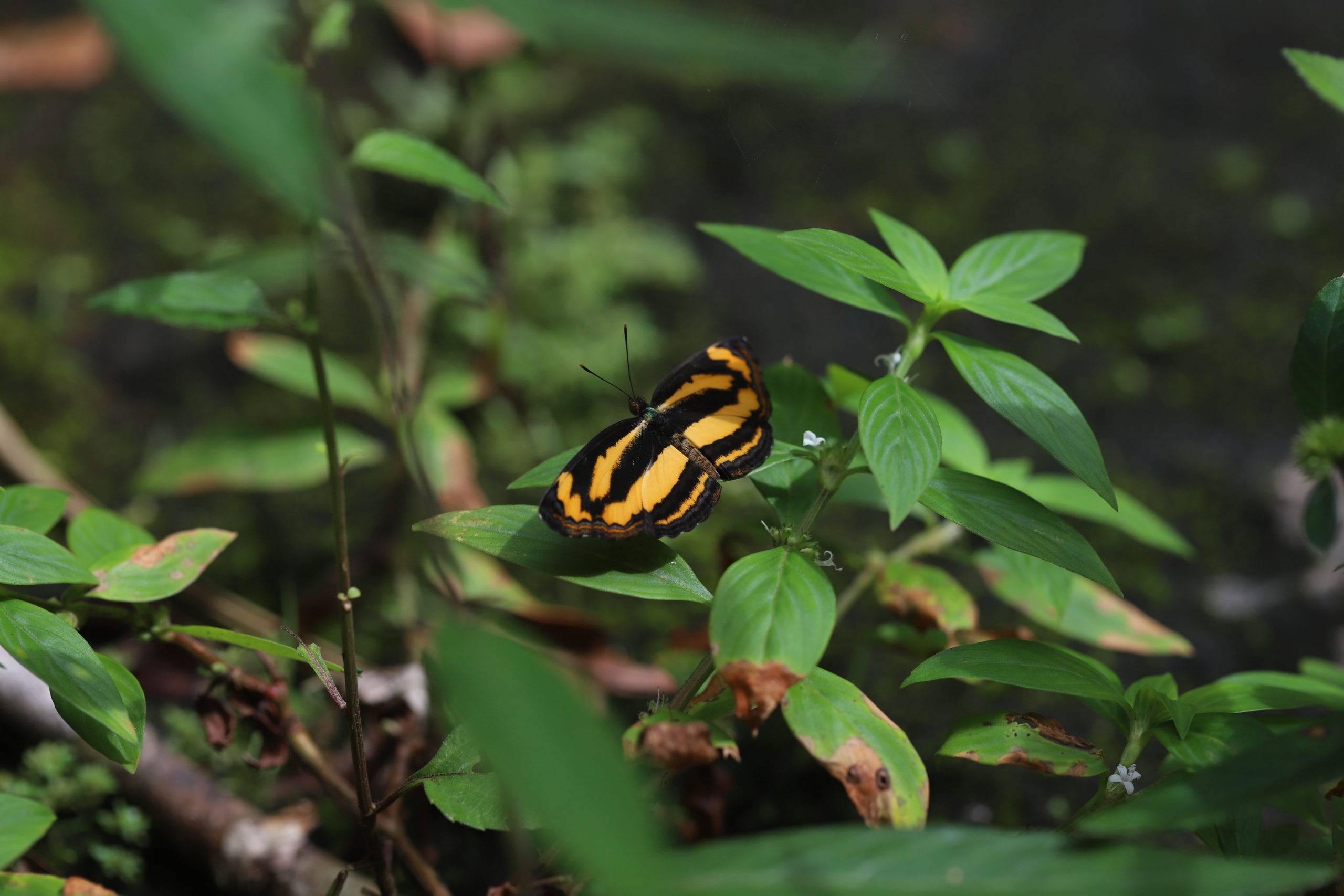
Life: Facilitating Connectivity Through Ecological Restoration in Kanneliya In Partnership With American And Efird Lanka (Pvt.) Ltd
Biodiversity Sri Lanka in partnership with the Forest Department, IUCN Sri Lanka and 10 selected private sector partners initiated the implementation of the project “Restoration and Management of a Degraded Fern Land in Kanneliya Forest Reserve” at Opatha in Kanneliya in February 2018. The site selected for restoration is best described as a degraded rainforest which has been cleared for cultivation and subsequently abandoned resulting in the colonization by the pioneer fern species Dicranopteris linearis (Kekilla). Despite the challenges, the project has advanced significantly. A significant proportion of the site is now under intensive ecological restoration practices. Further, it is encouraging to note the structural changes in vegetation as well as the resurgence of some new species of fauna after four years of restoration.
While activities were progressing successfully, American & Efird Lanka (Pvt) Ltd (A&E Lanka) came on board to support the restoration of an additional two-hectare degraded plot, adjacent to the existing restoration area, which would bring about connectivity between it and the nearby rainforest. This would facilitate wildlife movements across the area. The first year of A&E Lanka’s efforts have just concluded and we are moving into the second year. Notable progress has been made in the 1st year of the Project.
Based on the experience gained through the main Project, several adaptive restoration practices have been introduced. These practices have been instrumental in accelerating plant growth and increasing plant survival rates. The invasive Kekilla fern has been removed from approximately 60% of the A&E site. 2,412 large-sized (60cm3) planting pits prepared, soil conservation bunds introduced in a 1.2 ha area to prevent soil erosion, and clay pitches buried next to selected plants located in the dry, hilly areas of the site to ensure continuous water availability to plants during dry periods were some of the measures introduced. The on-site nursery produced and managed high-quality healthy plants. 18 native plant species and Glyricidia were introduced during the period. In addition, natural regeneration of two native species Veraniya and Mahabovitiya were observed after the removal of Kekilla.
The new site has attracted several species of butterflies, bees, and other nectar-feeding insects. The colonization of nectar and pollen-feeding insect species in the site indicates that ecological restoration is heading in the right direction because insects are often used to monitor the progress of the ecological restoration. Five (5) butterfly species – Ceylon Rose, Lemon Emigrant, Mottled Emigrant, Jezebel, and Three-spot Grass Yellow were recorded at the site as well as two (2) bee species – Carpenter Bee and the Eastern Honey Bee. In addition to ecological benefits, the Project provides social benefits including employment opportunities to adjacent communities. Overall, the project has made significant strides during the period under consideration towards its goal of converting the site to a well-functioning rainforest in the long run.



















